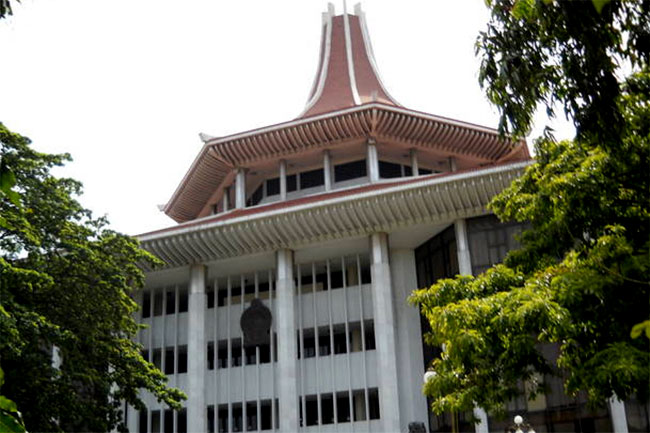The Supreme Court has dismissed three consolidated writ applications filed by Keheliya Rambukwella’s family, challenging the legality of ex parte freezing orders issued by the Commission to Investigate Allegations of Bribery or Corruption (CIABOC) under the Anti-Corruption Act, No. 9 of 2023.
The bench comprising Justices Janak de Silva, Priyantha Fernando, and Sampath B. Abayakoon held that CIABOC is legally empowered to issue freezing orders and seek their confirmation ex parte—without prior notice or hearing to the affected parties.
The petitions — S.C. (Writ) 03/2025, 04/2025, and 05/2025 — were filed by Kusum Priyadharshini Epa Weihana (wife of former minister Keheliya Rambukwella), Isuru Pulasthi Bandara Polgasdeniya (Rambukwella’s son-in-law), and Chandula Ramali Rambukwella (Rambukwella’s daughter).
They had challenged freezing orders issued by CIABOC pursuant to Section 53(1) of the Anti-Corruption Act, following a Suspicious Transaction Report (STR) received from the Financial Intelligence Unit (FIU) of the Central Bank on 5 March 2024.
The disputed orders, subsequently confirmed and extended by the High Court, covered the following assets:
- Kusum Priyadharshini Epa Weihana – a fixed deposit of Rs. 30 million at HNB, and savings and fixed deposits at Sampath Bank and Commercial Bank.
- Isuru Pulasthi Bandara Polgasdeniya – a fixed deposit of Rs. 14.125 million at HNB, a savings account at the Bank of Ceylon, and a motor vehicle (CBK 8549), which was also physically seized by CIABOC.
- Chandula Ramali Rambukwella – an HNB Assurance PLC life insurance policy valued at Rs. 8 million, and savings accounts at Sampath Bank and DFCC.
The petitioners sought writs of certiorari to quash both the CIABOC orders and their High Court confirmations, arguing that the ex parte process violated principles of natural justice and was ultra vires. They contended that CIABOC should have afforded them an opportunity to be heard before freezing their assets.
However, the Supreme Court rejected these arguments, finding that the petitioners had failed to establish a prima facie case warranting notice.
In its detailed reasoning, the Court underscored the following principles:
- Freezing Orders as Investigative Tools: The Court described freezing orders as temporary measures intended to prevent assets from being removed from the jurisdiction or otherwise disposed of, ensuring that investigations are not rendered futile.
- Necessity of Ex Parte Action: The Court held that requiring CIABOC to notify or hear a party before issuing such an order would defeat its purpose, as property could be transferred “within seconds” in the modern financial system.
- Statutory Basis for Ex Parte Confirmation: The Court found that the Anti-Corruption Act, through Section 112(2), incorporates provisions of the Prevention of Money Laundering Act (PMLA), which explicitly allows ex parte applications for High Court confirmation within seven days.
- Judicial Oversight as Safeguard: CIABOC’s power to freeze assets is not absolute, as the High Court must confirm and periodically review such orders. Section 53(12) also permits affected parties to request the court’s permission for essential transactions.
- No Writ Jurisdiction over High Court Judge: The Court ruled that writs could not be sought against the High Court judge who confirmed the orders, since Section 160(1) of the Anti-Corruption Act grants writ jurisdiction only where relief is sought against CIABOC.
- Legality of Seizure: The Court upheld the seizure of the motor vehicle (CBK 8549), noting that Section 45 of the Act authorises CIABOC to seize property believed to be evidence of an offence, supplementing its freezing powers under Section 53(5).
Concluding, the Supreme Court emphasised that the Anti-Corruption Act must be interpreted in a manner that makes the constitutional right to a government free of bribery and corruption “real and attainable, not merely aspirational.”




